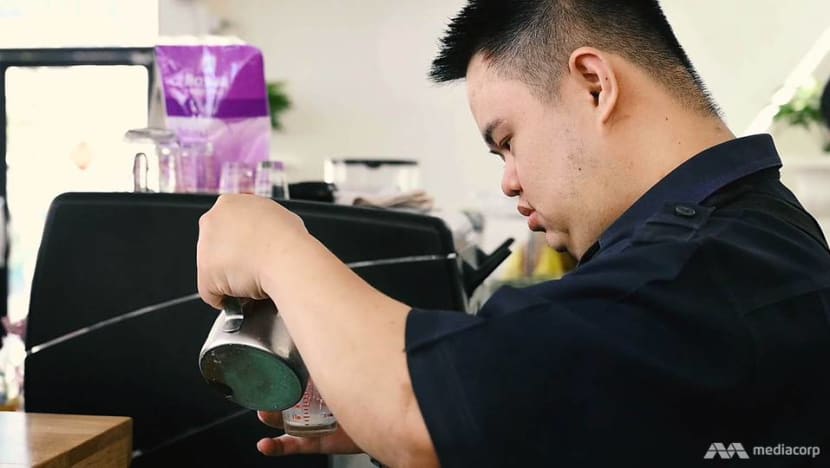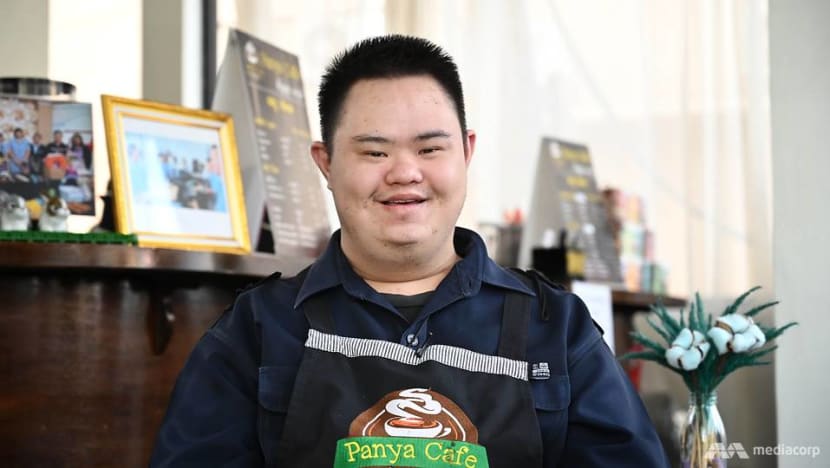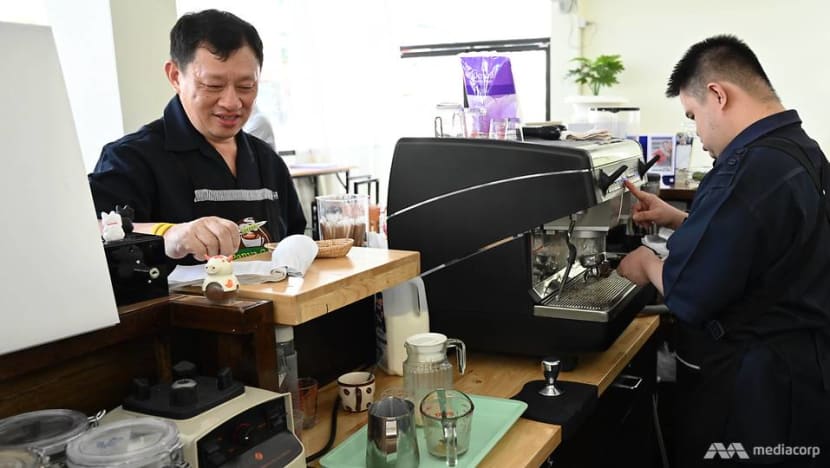Barista with Down Syndrome becomes social media sensation in Thailand
In a small roadside café of Bangkok, a barista with Down Syndrome works hard to fight social stigma and show what people with learning disabilities can do if given a chance.

Thakolrat ‘Jin’ Prongsuwan, 28, is a barista with Down Syndrome at a roadside café in Bangkok, Thailand. (Photo: Pichayada Promchertchoo)
BANGKOK: Jin’s mother had dreamt of owning a cafe before she died from cancer two years ago. If she had lived, she would have beamed with pride to know that her 28-year-old son, who has Down Syndrome, is brewing up her dream, with love and precision.
Thakolrat ‘Jin’ Prongsuwan recently shot to fame after his story was shared on Thai social media. His growing popularity has transformed a once empty cafe on busy Petchburi Road into a bustling space, with many customers dropping in to get their favourite drinks and take photos with him.
“One. Two. Three. Four.” Jin counted as he added spoonfuls of sugar into a measuring cup inside Panya Cafe last week. Many orders had been placed and the queue continued to grow.
The barista kept moving between the coffee machine, the assembly station and the sink, grinding beans, frothing milk and brewing drink after drink with total concentration. Espresso. Cappuccino. Latte. Iced mocha. He poured them into different cups, always making sure they perfectly reached the invisible line drawn by memory and years of training.
“I make coffee until 4.30pm,” Jin said. “I like drinking cappuccino and espresso, with ice.”

Jin got a job at Panya Cafe when it opened last May. He works with another colleague, who's autistic, to make coffee and tea from Monday to Friday. The business is operated by the non-profit Foundation for the Welfare of the Mentally Retarded, a leading organisation in Thailand that currently supports some 500 people with intellectual disabilities to live a full life in society.
Jin joined the foundation when he was seven years old, unable to speak a word. As someone with Down Syndrome, his physical and intellectual development was delayed. The condition is among the most common intellectual developmental disorders in Thailand.
According to the country's Mental Health Department, about 650,000 people live with intellectual disability nationwide but only 10 per cent of them have access to proper care and rehabilitation. In 2018, the department reported 75 per cent of 5 to 15-year-old intellectually disabled children did not receive formal education.
“Besides the neurological problems, there are only 30 schools or so in the whole country that cater for students with special needs. Educational personnel are also lacking,” said foundation chairman Cherd Theerakiatikun.
According to him, many parents do not realise their children suffer from developmental disabilities until they go to school and struggle with education. “Some children look normal but they can’t study and their teachers just don’t care. So after leaving school, they have nowhere to go and stay at home,” he said.
For those whose families are well-to-do, their parents tend to keep them inside their house.
People with intellectual disability still carry a social stigma in Thailand. Despite more acceptance than before, Cherd said these people need more support from society. The biggest problem, he added, is that 90 per cent of them are jobless.
“Without a job, they become a burden to their family,” Cherd told CNA.
OFFICIAL ASSESSMENTS
An intellectually disabled person is an individual who has an IQ score lower than 70 and lacks skills to carry out daily-life activities such as communication, self-care, self-direction, health and safety.
According to Thailand’s Department of Mental Health, the condition is divided into four levels based on IQ performance:
- Mild: 50-70 scores
- Moderate: 35-49 scores
- Severe: 20-34
- Profound: below 20 scores
People who have an IQ score of 50 or higher can benefit from educational programmes, according to the department. Meanwhile, those who score below 50 are considered trainable, meaning they can be trained necessary skills to carry out their daily life.
“If your IQ score is 10, for instance, your brain is like that of a newborn child. Your body may grow but your brain won’t. It means you won’t be able to walk. So it’s important to exercise your muscles in this case because your body will keep developing,” said Nutchanun Pruekpaibool from the Foundation for the Welfare of the Mentally Retarded.
Jin, she said, has an IQ score close to 70 and his brain is like that of a ten-year-old child. However, his physical abilities exceed those of children.
“He can help himself with many daily-life activities but he still can’t travel on his own,” Nutchanun added.
Years of education and vocational training at the foundation have helped Jin develop the potential to be able to work and earn a regular income. He has memorised more than ten recipes for different drinks at Panya Café and gets paid about US$300 a month.
Thai law demands governmental and private organisations must hire at least one intellectually disabled person for every 100 employees. They can also employ them on an annual contract with minimum wage of 300 Baht (US$10) per day.
‘GIVE THEM A CHANCE’
At the foundation, Jin and other students are provided with vocational training in areas ranging from arts and crafts to agriculture. About 100 students have been hired by various organisations to make coffee, work in a kitchen or assist teachers at schools.
The foundation runs nine facilities to support intellectually disabled children and adults. They include three pre-school establishments and the Panyawutikorn primary and secondary school in Bangkok, two vocational training centres, and three provincial facilities in northern Chiang Mai, northeastern Udon Thani and southern Songkhla.
“The education we provide is free of charge but we do accept donations if the family is well-to-do and wants to contribute,” Nutchanun said.

Intellectual disability is associated with genetic disorder but not exclusively. According to Nutchanun, some cases are preventable if babies receive sufficient nutrition and proper care during pregnancy.
“Nutrition is so important for brain development. But in Thailand, we don’t emphasise its significance enough,” she said.
"Intellectual disability can be prevented and improved. You can live (in mainstream society) if you receive proper care to help you develop as soon as you’re diagnosed. This condition is closer to us more than we think."
In Thailand, some parents still find it hard to accept their children suffer from an intellectual developmental disorder. Others do not realise the symptoms and thus fail to seek medical advice at an early stage. But even the children are provided with proper care and special education, they can hardly find a place to stand in society when they grow up.
“Society should give them opportunities. Don’t think they can’t do anything. They can but just not as much as everyone can do,” Cherd said.
Our society should give them a chance and see them as human beings with potential. If we give them a chance to fulfil their potential, the result would eventually benefit our society.
Back at Panya Cafe, Jin prepared to wrap his work for the day. He carefully poured freshly brewed Thai black tea from a measuring cup into a bottle for a customer’s takeaway order. Seeing the cup was empty, his colleague grabbed the bottle for packing.
“It’s not full yet,” Jin said and proceeded to make more tea. Then slowly, the barista topped up the drink until it exactly reached that invisible line.
Like everything he does, the most important thing is precision.














